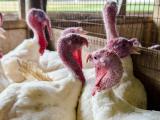April 20, 2005 (CIDRAP News) – Vietnam will get rid of small live-poultry markets, cull ducks, and convert to factory-style farming in 15 cities and provinces to beat back the H5N1 avian influenza virus, under plans announced yesterday.
An existing ban on poultry raising in Ho Chi Minh City will be extended to Hanoi, Hue and Danang, Quang Ninh, and the Mekong Delta province of Can Tho, among other places, according to a report published yesterday by Agence France-Presse (AFP). Free-range waterfowl breeding will be banned, the Agriculture Ministry announced.
Poultry vaccinations will begin in August, and the program will expand to high-risk areas in early October, AFP reported. The estimated $6.3 million for each year of the 2-year program will be paid by the Vietnamese government.
Compliance with the existing rules for containing avian flu has been spotty, according to a Bloomberg News story.
A government report issued April 18 said poultry checks remain inconsistent at international borders, many farmers don't know how to prevent flu among birds, dead poultry are not properly disposed of, and sick poultry continue to be consumed, according to the Bloomberg story. In Ho Chi Minh City, where poultry raising has been banned, chickens still roam freely, the story said.
"The awareness of people and administration at all levels of the danger of the disease is not yet complete," the report said. "The implementation of our laws on animal health is not yet serious, especially on reporting about the epidemic, trading, transportation, and the slaughter of poultry."
As Vietnam pushes for internal changes, Asian nations are emphasizing collaborations among countries. The Association of Southeast Asian Nations (ASEAN) ended a 2-day conference in Bangkok today by pledging greater cooperation in fighting avian flu. Specifically, the conference emphasized developing vaccines, improving data-sharing, and defining public health responses, AFP reported.
Asian countries should push harder to stockpile antiviral medication and develop vaccines, experts said.
"Each individual country should develop their own bird flu vaccine, and we should not be preoccupied and worried about the infringement of intellectual property," said Senator Kraisak Choonhavan, chairman of Thailand's senate foreign relations committee, as the conference wrapped up today.
A World Health Organization (WHO) official emphasized speedy sharing of information.
"Collaboration in research can lead to a better understanding of the problem, and this is important because this is an evolving or changing infectious agent," the WHO's Southeast Asia regional director, Samlee Plianbanghcang, told AFP. "The avian influenza virus can modify and change itself, so we need to be constantly updating, exchanging information between countries."



















